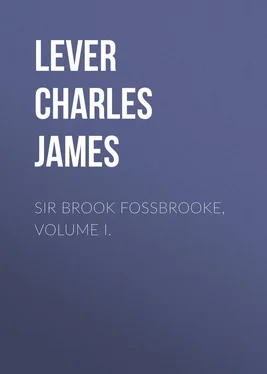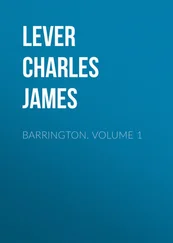Charles Lever - Sir Brook Fossbrooke, Volume I.
Здесь есть возможность читать онлайн «Charles Lever - Sir Brook Fossbrooke, Volume I.» — ознакомительный отрывок электронной книги совершенно бесплатно, а после прочтения отрывка купить полную версию. В некоторых случаях можно слушать аудио, скачать через торрент в формате fb2 и присутствует краткое содержание. Жанр: literature_19, foreign_antique, foreign_prose, на английском языке. Описание произведения, (предисловие) а так же отзывы посетителей доступны на портале библиотеки ЛибКат.
- Название:Sir Brook Fossbrooke, Volume I.
- Автор:
- Жанр:
- Год:неизвестен
- ISBN:нет данных
- Рейтинг книги:3 / 5. Голосов: 1
-
Избранное:Добавить в избранное
- Отзывы:
-
Ваша оценка:
- 60
- 1
- 2
- 3
- 4
- 5
Sir Brook Fossbrooke, Volume I.: краткое содержание, описание и аннотация
Предлагаем к чтению аннотацию, описание, краткое содержание или предисловие (зависит от того, что написал сам автор книги «Sir Brook Fossbrooke, Volume I.»). Если вы не нашли необходимую информацию о книге — напишите в комментариях, мы постараемся отыскать её.
Sir Brook Fossbrooke, Volume I. — читать онлайн ознакомительный отрывок
Ниже представлен текст книги, разбитый по страницам. Система сохранения места последней прочитанной страницы, позволяет с удобством читать онлайн бесплатно книгу «Sir Brook Fossbrooke, Volume I.», без необходимости каждый раз заново искать на чём Вы остановились. Поставьте закладку, и сможете в любой момент перейти на страницу, на которой закончили чтение.
Интервал:
Закладка:
And Trafford and Lucy all this time, – what did they talk of? Did they, too, imagine a future and plan out a life-road in company? Far too timid for that, – they lingered over the past, each asking some trait of the other’s childhood, eager to hear any little incident which might mark character or indicate temper. And at last they came down to the present, – to the very hour they lived in, and laughingly wondered at the intimacy that had grown up between them. “Only twelve days to-morrow since we first met,” said Lucy, and her color rose as she said it, “and here we are talking away as if – as if – ”
“As if what?” cried he, only by an effort suppressing her name as it rose to his lips.
“As if we knew each other for years. To me it seems the strangest thing in the world, – I who have never had friendships or companionships. To you, I have no doubt, it is common enough.”
“But it is not,” cried he, eagerly. “Such fortune never befell me before. I have gone a good deal into life, – seen scores of people in country-houses and the like; but I never met any one before I could speak to of myself, – I mean, that I had courage to tell – not that, exactly – but that I wanted them to know I was n’t so bad a fellow – so reckless or so heartless as people thought me.”
“And is that the character you bear?” said she, with, though not visible to him, a faint smile on her mouth.
“I think it’s what my family would say of me, – I mean now, for once on a time I was a favorite at home.”
“And why are you not still?”
“Because I was extravagant; because I went into debt; because I got very easily into scrapes, and very badly out of them, – not dishonorably, mind; the scrapes I speak of were money troubles, and they brought me into collision with my governor. That was how it came about I was sent over here. They meant as a punishment what has turned out the greatest happiness of my life.”
“How cold the water is!” said Lucy, as, taking off her glove, she suffered her hand to dip in the water beside the boat.
“Deliciously cold,” said he, as, plunging in his hand, he managed, as though by accident, to touch hers. She drew it rapidly away, however, and then, to prevent the conversation returning to its former channel, said aloud: “What are you laughing over so heartily, Sir Brook? You and Tom appear to have fallen upon a mine of drollery. Do share it with us.”
“You shall hear it all one of these days, Lucy. Jog the doctor’s arm now and wake him up, for I see the lights at the boat-house, and we shall soon be on shore.”
“And sorry I am for it,” muttered Trafford, in a whisper; “I wish this night could be drawn out to years.”
CHAPTER VI. WAITING ON
On the sixth day after Dr. Lendrick’s arrival in Dublin – a fruitless journey so far as any hope of reconciliation was concerned – he resolved to return home. His friend Beattie, however, induced him to delay his departure to the-next day, clinging to some small hope from a few words-that had dropped from Sir William on that same morning. “Let me see you to-night, doctor; I have a note to show you which I could not to-day with all these people about me.” Now, the people in question resolved themselves into one person, Lady Lendrick, who indeed bustled into the room and out of it, slammed doors and upset chairs in a fashion that might well have excused the exaggeration that converted her into a noun of multitude. A very warm altercation had occurred, too, in the doctor’s presence with reference to some letter from India, which Lady Lendrick was urging Sir William to reply to, but which he firmly declared he would not answer.
“How I am to treat a man subject to such attacks of temper, so easily provoked, and so incessantly irritated, is not clear to me. At all events I will see him to-night, and hear what he has to say to me. I am sure it has no concern with this letter from India.” With these words Beattie induced his friend to defer his journey for another day.
It was a long and anxious day to poor Lendrick. It was not alone that he had to suffer the bitter disappointment of all his hopes of being received by his father and admitted to some gleam of future favor, but he had discovered that certain debts which he had believed long settled by the judge were still outstanding against him, Lady Lendrick having interfered to prevent their payment, while she assured the creditors that if they had patience Dr. Lendrick would one day or other be in a position to acquit them. Between two and three thousand pounds thus hung over him of indebtedness above all his calculations, and equally above all his ability to meet.
“We thought you knew all this, Dr. Lendrick,” said Mr. Hack, Sir William’s agent; “we imagined you were a party to the arrangement, understanding that you were reluctant to bring these debts under the Chief Baron’s eyes, being moneys lent to your wife’s relations.”
“I believed that they were paid,” was all his reply, for the story was a painful one of trust betrayed and confidence abused, and he did not desire to revive it. He had often been told that his stepmother was the real obstacle to all hope of reconciliation with his father, but that she had pushed her enmity to him to the extent of his ruin was more than he was prepared for. They had never met, but at one time letters had frequently passed between them. Hers were marvels of good wishes and kind intentions, dashed with certain melancholy reflections over some shadowy unknown something which had been the cause of his estrangement from his father, but which time and endurance might not impossibly diminish the bitterness of, though with very little hope of leading to a more amicable relation. She would assume, besides, occasionally a kind of companionship in sorrow, and, as though the confession had burst from her unawares, avow that Sir William’s temper was more than human nature was called upon to submit to, and that years only added to those violent outbursts of passion which made the existence of all around him a perpetual martyrdom. These always wound up with some sweet congratulations on “Tom’s good fortune in his life of peaceful retirement,” and the “tranquil pleasures of that charming spot of which every one tells me such wonders, and which the hope of visiting is one of my most entrancing daydreams.” We give the passage textually, because it occurred without a change of a word thus in no less than five different letters.
This formal repetition of a phrase, and certain mistakes she made about the names of his children, first opened Lendrick’s eyes as to the sincerity and affection of his correspondent, for he was the least suspicious of men, and regarded distrust as a disgrace to him who entertained it.
Over all these things now did he ponder during this long dreary day. He did not like to go out lest he should meet old acquaintances and be interrogated about his father, of whom he knew less than almost every one. He shunned the tone of compassionate interest men met him with, and he dreaded even the old faces that reminded him of the past. He could not read: he tried, but could not. After a few minutes he found that his thoughts wandered off from the book and centred on his own concerns, till his head ached with the weary round of those difficulties which came ever back, and back, and back again undiminished, unrelieved, and unsolved. The embarrassments of life are not, like chess problems, to be resolved by a skilful combination: they are to be encountered by temper, by patience, by daring at one time, by submission at another, by a careful consideration of a man’s own powers, and by a clear-sighted estimate of his neighbors; and all these exercised not beforehand, nor in retirement, but on the very field itself where the conflict is raging and the fight at its hottest.
Читать дальшеИнтервал:
Закладка:
Похожие книги на «Sir Brook Fossbrooke, Volume I.»
Представляем Вашему вниманию похожие книги на «Sir Brook Fossbrooke, Volume I.» списком для выбора. Мы отобрали схожую по названию и смыслу литературу в надежде предоставить читателям больше вариантов отыскать новые, интересные, ещё непрочитанные произведения.
Обсуждение, отзывы о книге «Sir Brook Fossbrooke, Volume I.» и просто собственные мнения читателей. Оставьте ваши комментарии, напишите, что Вы думаете о произведении, его смысле или главных героях. Укажите что конкретно понравилось, а что нет, и почему Вы так считаете.












